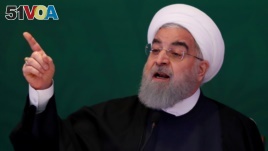07 May, 2018
Iranian President Hassan Rouhani has suggested that Iran could stay in a major nuclear deal even if the United States withdraws.
Reuters news service reported that Rouhani made the comments on state television Monday. He said, "We are not worried about America's cruel decisions...We are prepared for all scenarios and no change will occur in our lives next week."
The Iranian president added that his country could stay in the 2015 deal if its interests are guaranteed by other countries that are part of the agreement.
"If we can get what we want from a deal without America, then Iran will continue to remain committed to the deal," he said.

Iranian President Hassan Rouhani spoke on state television to say Iran might seek to stay in the nuclear deal that has reduced sanctions on his country even if the U.S. withdraws from it. In this picture, he is speaking earlier this year.
Deal criticized as flawed
The administration of U.S. President Donald Trump has strongly criticized the nuclear deal agreed to in 2015 by several powerful countries.
Under the agreement, Iran promised to limit its uranium enrichment activities so that it could not create enough fuel for nuclear weapons. In exchange, billions of dollars of seized Iranian money was released and many restrictions on the country were ended, including some on oil sales.
France, Germany, Britain, Russia and China are the other members of the agreement.
Trump had criticized the deal even before he entered the 2016 American presidential campaign. He has threatened to not extend waivers of the restrictions. This would effectively put many trade restrictions back in place.
The U.S. president said "flaws" in the agreement must be fixed before he is willing to extend the waivers again. They are set to end on May 12.
Britain, France and Germany want the deal to continue. French President Emanuel Macron and German Chancellor Angela Merkel have sought to persuade Trump to think the same.
On Monday, Vice President Mike Pence is to hold talks with British Foreign Secretary Boris Johnson in Washington. The Iran deal will be a main subject of discussion.
Before his visit, Johnson said Britain, the U.S. and European countries want Iran to stop activities that are making the Middle East less secure. He said these include "its cyber activities, its support for groups like Hezbollah, and its dangerous missile program, which is arming Houthi militias in Yemen."
May 12 is the time limit for the waivers to be extended. However, two possibilities may delay any change even if the U.S. restarts sanctions.
The deal calls for dispute resolution that requires parties to provide at least 35 days to consider if any party has violated its terms.
Also, if sanctions are put back in effect, U.S. law would give banks of nations that signed the deal 180 days to put the renewed restrictions in place.
Iran says it will not reduce its efforts to influence the Middle East. The country has denied that it is seeking nuclear weapons. It has repeatedly said its missile program is for defensive purposes only.
Economic conditions are poor in Iran. Unemployment remains high while the exchange value of Iranian money has fallen. However, the nuclear deal permits Iran to sell oil to the West at a time when oil prices are at their highest level in several years.
The United Nations nuclear agency has said that Iran is observing the terms of the 2015 deal. Critics, however, answer that the deal does not do enough to make sure that Iran does not develop nuclear weapons.
On Sunday, Rouhani threatened the U.S. if it withdrew from the nuclear agreement. "You will soon see that they will regret it like never before in history," he said.
I'm Mario Ritter.
Mario Ritter adapted this Reuters story for VOA Learning English with additional material from VOA News. Caty Weaver was the editor.
________________________________________________________________
Words in This Story
scenario –n. a description of what could possibly happen
occur –v. to happen, to take place
waivers –n. to choose not to do or enforce something that otherwise would have to be done or enforced
flaws –n. a problem or weakness
cyber –adj. related to computers and the internet
We want to hear from you. Write to us in the Comments section, and visit 51VOA.COM.